“这是不平等!”探索负面在线评论的潜在积极影响
IF 7.8
1区 管理学
Q1 HOSPITALITY, LEISURE, SPORT & TOURISM
引用次数: 0
摘要
负面评论显著影响着消费者在酒店业的决策。随着审查量的增加,对所有审查作出响应变得不切实际,这就需要有针对性的策略。本研究利用认知失调和公平理论,探讨了负面评论类型(主观与客观)如何影响消费者的感知和行为。采用准自然实验设计和被试间实验设计的混合方法。本研究表明,主观评价能增强信任,而客观评价则能唤起更大的同理心和预订意愿。信任和共情共同中介文本类型对预订决策的影响。快速的回复对于主观评价也更有效,而更慢、更深思熟虑的回复则适合客观评价。这些发现挑战了客观评论和快速反应总是更有效的传统观念,并为管理负面在线评论提供了理论和实践见解。本文章由计算机程序翻译,如有差异,请以英文原文为准。
“This is inequity!” Exploring the potential positive impact of negative online reviews
Negative reviews significantly influence consumer decisions in hospitality. As review volume increases, responding to all reviews becomes impractical, prompting the need for targeted strategies. This study explores how negative review types (subjective vs. objective) affect consumer perceptions and behaviour, drawing on cognitive dissonance and equity theories. A mixed-method approach was used, employing quasi-natural experimental design and between-subject experimental design. This research shows that subjective reviews enhance trust, whereas objective reviews evoke greater empathy and booking intention. Trust and empathy jointly mediate the effect of text type on booking decisions. Faster responses are also more effective for subjective reviews, whereas slower, more thoughtful replies suit objective reviews. These findings challenge the traditional belief that objective comments and rapid responses are always more effective and offer theoretical and practical insights into managing negative online reviews.
求助全文
通过发布文献求助,成功后即可免费获取论文全文。
去求助
来源期刊
CiteScore
13.30
自引率
8.40%
发文量
177
审稿时长
45 days
期刊介绍:
Journal Name: Journal of Hospitality and Tourism Management
Affiliation: Official journal of CAUTHE (Council for Australasian Tourism and Hospitality Education Inc.)
Scope:
Broad range of topics including:
Tourism and travel management
Leisure and recreation studies
Emerging field of event management
Content:
Contains both theoretical and applied research papers
Encourages submission of results of collaborative research between academia and industry.

 求助内容:
求助内容: 应助结果提醒方式:
应助结果提醒方式:


